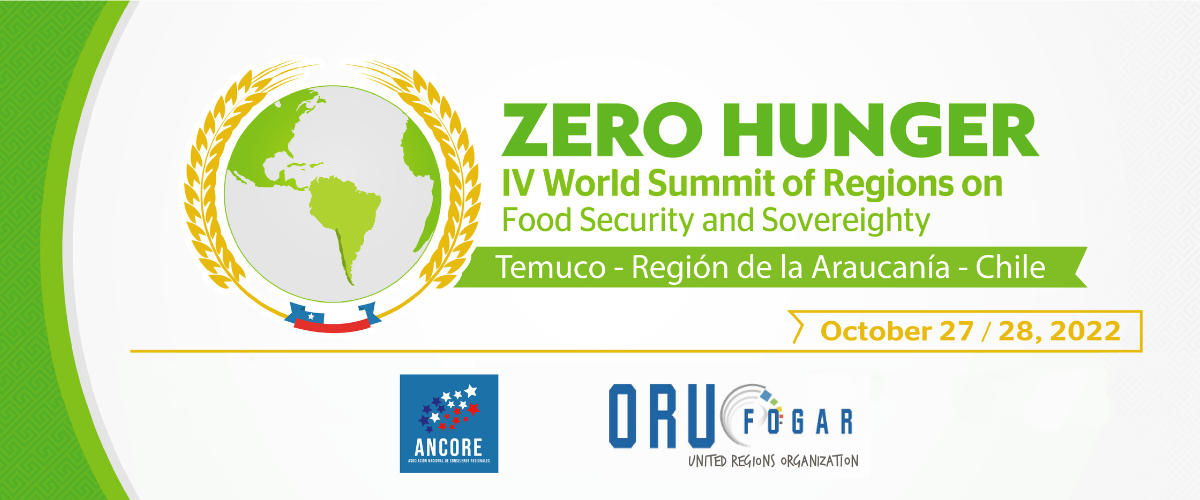A manifesto for the IV Summit

Baltazar Lantarón
Regional Governor of Apurimac, Peru.
President of the Regional Commonwealth of the Andes
President of the ORU Fogar Food Safety Committee
The Fourth Summit of Regions on Food Security comes at a very relevant time. We are all seeing how, all over the world, the perfect storm is brewing for what Paul Roberts, our luxury speaker, called "The end of the food" or "Hunger Coming". In recent months we have seen unprecedented increases in the prices of raw materials and food. The causes are diverse. Here there are problems very deep and coming from far.
We thought that globalization gave us security. Food came from all over the world. They were bought where they offered better conditions. The COVID19 pandemic, however, put obstacles in the way of all supply chains, completely altering world food trade. The war in Ukraine then made the price of fossil fuels more expensive, raising the price of transport and fertilizers, with a direct effect on food. Before, during and after these situations, climate change. And with heat, fires, droughts and floods, agricultural production is at best reduced.
With this scenario, it will be impossible to meet the Objective 2 Zero Hunger that the United Nations had set in the 2030 Agenda. Malnutrition figures are rising. So are those of people suffering from acute hunger. The Ukrainian War, in any case, is putting many millions of people at risk of hunger, especially in Africa.
Nobody escapes the gravity of the situation, but, if we are going to be in Temuco, Araucanía, Chile, at the Fourth Summit "Zero Hunger", it is precisely to find solutions and see how we act. As Côre Group of Food Sovereignty we have the task of presenting a draft manifesto that will be discussed and approved by the Assembly of ORU Fogar. We’ve been working on it for weeks.
Strengthening food security in the territories
With the current generalized price rise, the first thing we propose is that each region draw up a shock plan that guarantees the supply of food, ensuring that distribution networks reach all corners of the territory. This shock plan, in our opinion, must include:
- Ensure the provision of food to the most vulnerable populations.
- Special attention should be paid to children so that this crisis does not affect their development.
- support for agriculture and the primary sector in general with local and regional networks for the distribution of their products.
- Protection and support for distribution networks and local markets.
Having overcome this situation in the coming months, regional governments must, we believe, have a Strategic Plan for Food Security updated periodically.
Governance and Decentralization
Beyond the conjuncture, the reaction we must adopt is easy, because it is what the regionalist movement has always advocated: good governance and strengthening food security in the territories.
If hunger does not end in many parts of the world, it is because of social conflicts, pandemics or wars, but also because of bad governance. Centralized and bureaucratic administration is inefficient in solving hunger problems. The coming struggle will require governance in which all levels of government participate under the principle of subsidiarity. For this reason, regional governments cannot be spared either their powers or their economic and human resources.
In low-income countries, but also in some low-middle-income countries where agriculture is essential to the economy, employment and livelihoods, governments should increase and prioritize spending on services that support food and agriculture more collectively. This is crucial to sub-heal the productivity gaps in nutritious food production and to enable income generation in order to improve the affordability of healthy diets, although significant development funding will be required.
There is a debate about whether we should talk about security or food sovereignty. We will talk about this at the Summit. It is clear, in any case, that resilience must be strengthened in the territory and that, at this time, it is important to ensure maximum food production in the region, and thus, priority should be given to food.
Proximity, the production of Km0, the creation of designations of origin, family farming and even native gastronomy.
We want to focus on another point. With a climate crisis that is desertifying territories and depleting water resources in many geographies, proper freshwater management will require very effective management. Water security will demand funding like never before. It will be necessary to avoid losses and leaks, take advantage of rainwater, recycle waste water and build desalination plants. As important as funding, will be to recognize the role in this management of territorial governments. Around the world, municipal governments have recognized the role, both in the supply of water to homes, and in the disposal of wastewater. In many countries, however, resource planning and management remains extremely centralized, making it in many cases very inefficient. The threat facing many countries should be an opportunity to rethink the distribution of competences in the field of water management, so that regional governments take a leading role. They are, finally, who, with a precise knowledge of their territory, know where the resources are and where the water needs.
This will be more or less our proposal. Open to debate in the coming weeks. See you in Temuco.










































































